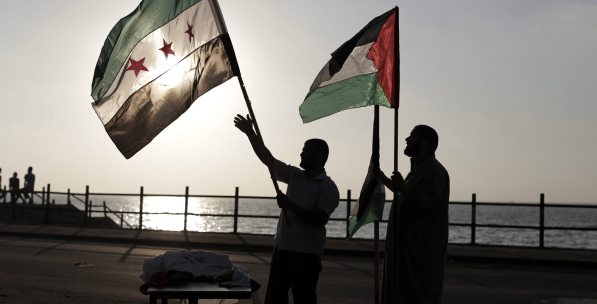The Syrian crisis that has so far cost more than 100,000 lives since March 15, 2011, only became the top item on the international agenda after the Syrian Baath administration’s use of chemical weapons on Aug. 21. Nevertheless, not even this has really changed the way Syria has been discussed in the international arena for the last two and a half years. As always, there is an abundance of analyses of “Syria without Syria” floating around. Particularly, the possibility of a military intervention in Syria, led by the United States, has shaped a discussion in which Syrians are only incidentally considered. America’s inability to exhibit a coherent and foreseeable policy in the region has seriously impacted the way the debate over Syria has been shaped.
The most significant concern regarding the Syrian crisis is the possibility that the conflict will spread across the region. Repeating this observation, which has become a cliché, does not constitute an analysis of the situation in the region, because it brings with itself a question: So, what should be done in Syria? Since the crisis began, the only way to prevent it from spreading has always been to stop the Bashar al-Assad administration. This did not necessarily entail a military intervention, or the providing of arms to the opposition. One way to stop the al-Assad administration, to begin with, was to stop those who were intervening in the Syrian crisis on its behalf. Israel and the West wanted a weakened and incapacitated al-Assad. Russia and Iran exploited Syria as cheap bargaining material during a crisis in which Syrians bore the cost. Where we stand today, neither of those actors who intervened on al-Assad’s behalf have achieved what they wanted, at the cost of Syria itself, nor does there seem to be political stability in the region’s future.
Where will the Syrian crisis spread to? What will the region be like today if there had not been a Syrian crisis? Could the Syrian crisis lead the region into an even worse crisis? Iraq continues to be the scene of intense sectarian power struggles. Hundreds of people are already dying every month without any help from the sectarian chaos of Syria. Lebanon is at a political standstill, and since Abdullah al-Hariri’s assassination all political actors there have surrendered themselves to this political blockage. The crisis continues in Palestine after the coup, supported by the West, ousted the elected Hamas government. Jordan has been congested as a political buffer zone since the Arab Spring. Israel continues, without skipping a beat, to expand its settlements a little more each year.
The only way the Syrian crisis could exacerbate the chaos already in the region would be if the countries in the region abandoned their strategy of proxy wars and decided to fight each other directly. However, we know very well that no political actor would opt for war without serious provocations. The last direct war in the region was between Iraq and Iran, which has come to be known as the longest war of the last century. I do not think any actor would intentionally choose such a fate. At the end, the only guarantee that the Syrian crisis will not spread in the region is to stop al-Assad’s massacres.
[Hurriyet Daily News, September 06, 2013]









